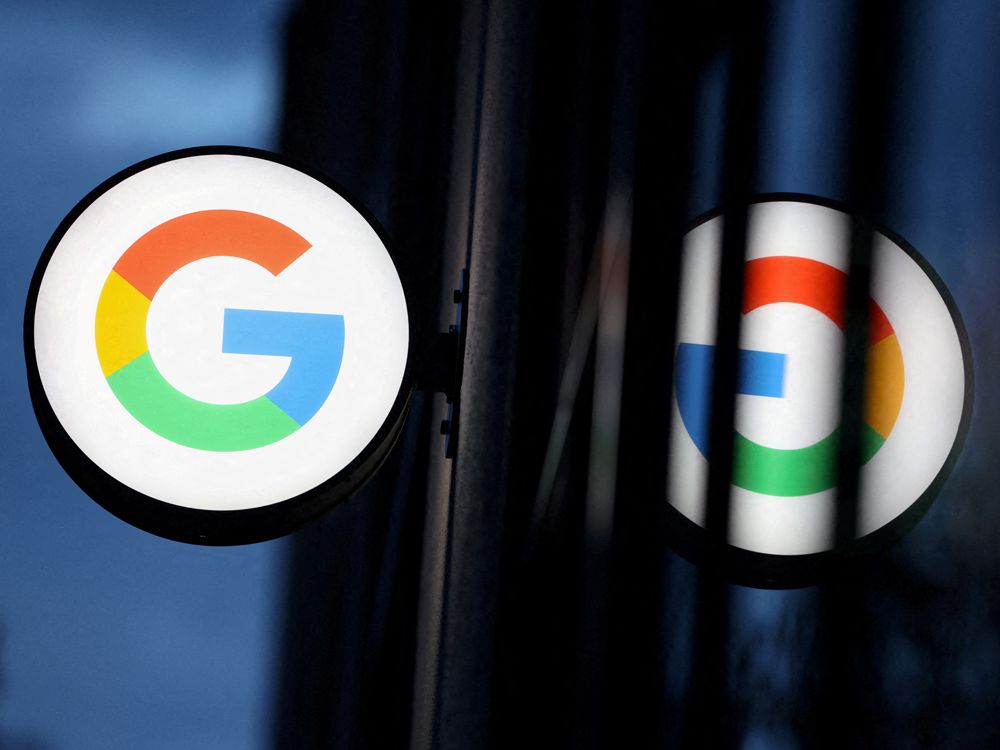At $138, a share of the tech giant hasn’t been this cheap since 2005
Author of the article:
Bloomberg News
Jeran Wittenstein and Vivianne Rodrigues
Alphabet Inc. said late Tuesday it will increase its outstanding shares by a 20-to-1 ratio, aiming to entice the numerous small investors who have flocked to the stock market during the pandemic. Photo by REUTERS/Andrew Kelly/File Photo Alphabet Inc. is bringing big stock splits back to the market, so prospective buyers won’t need upwards of US$3,000 to own a share. Taking down the price achieves something else for the Google parent: making it possible to put America’s third-biggest company into its most venerated stock average.
Advertisement This advertisement has not loaded yet, but your article continues below.
The company said late Tuesday it will increase its outstanding shares by a 20-to-1 ratio, aiming to entice the numerous small investors who have flocked to the stock market during the pandemic. The shares jumped 10 per cent in U.S. premarket trading on Wednesday.
“The reason for the split is it makes our shares more accessible,” Ruth Porat, Alphabet’s chief financial officer, said in a conference call with television anchors. “We thought it made sense to do.”
For mom-and-pop traders, a lower stock price makes it easier to buy shares rather than purchase fractional stocks through their brokerage firms. Alphabet’s 20-for-1 split would reduce the price of Class A shares to roughly US$138, based on Tuesday’s closing price of US$2,752.88. A share of the company hasn’t been that cheap since 2005.
Advertisement This advertisement has not loaded yet, but your article continues below.
“Institutional investors can buy in size and the price per share doesn’t matter,” said Ed Clissold, chief U.S. strategist at Ned Davis Research. “But for a smaller investor, a lower price-per-share makes it easier for them to buy a reasonable number of shares.”
Shares are set to open at a record high after the stock split announcement and blowout fourth-quarter numbers. The Google-owner’s sales and profit topped analysts’ projections for the holiday quarter, showing the resilience of its advertising business in the face of major economic upheaval as the pandemic persists.
Dow Entry Another motivation for the split could be gaining entry to the Dow Jones Industrial Average, whose price-weighted index has been a barrier for years to the likes of Alphabet and also Amazon.com Inc., which has a four-figure stock price, according to Michael O’Rourke, chief market strategist at Jonestrading.
This advertisement has not loaded yet, but your article continues below.
Article content The Dow’s archaic weighting system is based on share price rather than market capitalization, and in Alphabet’s presplit form it was just too big to add to the gauge without it overwhelming all the other members.
Google parent Alphabet’s sales top estimates, show strength of ad business Darker market mood sets in one year after meme stock frenzy David Rosenberg: NFTs may be nifty, but not when it comes to investing in them Share splits have nearly disappeared from U.S. stock markets recently, with only two in 2019 compared with 47 splits in the S&P 500 in 2006 and 2007. But Apple Inc. and Tesla Inc., brought it back to attention after they split their stocks in 2020.
Now, the spotlight shifts to the only other megacap whose shares have a four-digit price tag — Amazon. The digital retailer has long been the subject of speculation about a potential split. With a stock price that closed at US$3,023.87 on Tuesday, the e-commerce giant is one of only seven companies in the S&P 500 that trade for more US$1,000 and, excluding Alphabet, is by far the biggest.
For Morgan Stanley analyst Brian Nowak, Alphabet’s “improved shareholder friendliness” now puts pressure on Amazon to look into buybacks and a stock split. Amazon split its stock three times in 1998 and 1999 and hasn’t done one since.
Bloomberg.com
Listen to Down to Business for in-depth discussions and insights into the latest in Canadian business, available wherever you get your podcasts . Check out the latest episode below:
Financial Post Top Stories Sign up to receive the daily top stories from the Financial Post, a division of Postmedia Network Inc.
By clicking on the sign up button you consent to receive the above newsletter from Postmedia Network Inc. You may unsubscribe any time by clicking on the unsubscribe link at the bottom of our emails. Postmedia Network Inc. | 365 Bloor Street East, Toronto, Ontario, M4W 3L4 | 416-383-2300
